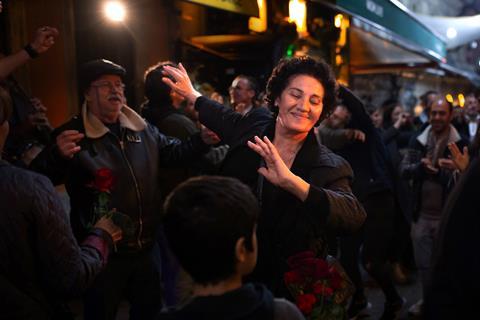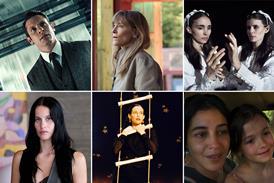An ageing Georgian woman travels to Istanbul in search of her trans niece in Panorama’s elegiac opener

Dir/scr: Levan Akin. Sweden/Denmark/France/Turkey/Georgia, 2024. 106 mins
Levan Akin brings beauty to the back streets and back waters of the Bosphorus in Crossing, an elegy of travel and trans life which ebbs and flows between Georgia and Istanbul. Dream-like even as it cruises through a purposefully-shaped narrative, this fourth feature from Akin opens the Berlinale’s Panorama sidebar with a visual elegance and an eloquent vision of acceptance.
Visual elegance and an eloquent vision of acceptance
Picked up by Mubi (for UK, North America, Germany and LatAm) prior to Berlin, this is prestige cinema to touch imaginations while tapping into some deeper truths. Swedish-national Akin, whose last feature And Then We Danced represented the country at the Academy Awards while also dealing with his Turkish/Georgian heritage and LGBTQI issues, takes his characters and viewers on a voyage together. It’s seductive, fragmented, involving. It also always bends to his will, as a heart-breaking final act attests.
Not precisely a crowd-pleaser but so very pleasing to the eye, Crossing – which is partially based on a real-life story – follows an older woman from Batumi in Georgia across the Black Sea to Istanbul in search of her missing trans niece, known as Tekla. Crusty former history teacher Miss Lia (Mzia Arabuli) needs help fulfilling a promise to her dead sister, and it appears in the unlikely – and somewhat untrustworthy – guise of Achi (Lucas Kanvava), a young scrounger who squats with his brother in a cottage by the sea in Batumi. Claiming to have Tekla’s address, and also to speak Turkish and English, he persuades the raki-loving older woman to bring him with her to Istanbul. (She’ll need some money for food, at the very least, as he can’t ever cram enough into his mouth. Everyone in this film is looking for some sort of sustenance.)
Miss Lia, as played by 72-year-old veteran actor Arabuli with appropriate intelligence and hauteur, is stern and disapproving. “Georgian women have lost all their dignity,” she sniffs on the ferry from Batumi at the glimpse of a bare leg, even though she’ll out-drink any man who’s paying. She refers to Tekla as having made a ‘choice’. “I hardly think it was a choice,” counters young Achi, as they begin to discover the options open to Tekla in Turkey’s ancient, sprawling former capital. They are not what anyone would choose, although there’s a camaraderie and support within the community which would undoubtedly better anything Tekla received at home in Batumi from her mother or aunt.
After the journey to Istanbul, the cast begins to open up and the film switches to Everim (Deniz Dumanl), a trans activist working for the NGO Pink Life in Istanbul who will cross the path of this odd couple. Akin’s allegiances waver as well: is Miss Lia, clearly a former beauty, his embittered heroine, or does she represent the past? And is the positive force-of-life Everim, chasing her sex-change certificates and a foothold as a legal advocate for the disadvantaged, the way of the future for Turkey? As a writer, Akin has created two fierce female characters and his film treats them both responsibly – even if it’s harder to find a path to truth for Miss Lia, and he must resort to a poignant fantasy which may make or break the film for some viewers.
Akin’s characters are always on the move. For Everim, it’s in and out of taxis and restlessly towards acceptance and sexual fulfilment. On the ferries, whether they be on the Bosphorus or gliding through the Black Sea, Miss Lia and Achi are Georgia past and present silhouetted against some of the unchanging wonders of Istanbul, accompanied by mostly traditional music which strikes a plaintive note. Moving through the city’s dirty back streets, Lisabi Fridell’s camera makes much use of the unique, bathing Golden Hour light of Istanbul, “a place people come to disappear”. Imagery here is fluid too: it can also sway with the water or hold still to capture a dawn.
And Then We Danced was a love story between men which provoked protest in Georgia. Crossing, at pains to inform the viewer that Georgian and Turkish language is gender neutral, is less directly confrontational even as it faces issues head-on. Yet it is all lot about love as well, even if the people in it come late to that realisation.
Production companies: French Quarter, Easy Riders, Adomeit, 1991 Productions
International sales: Totem Films, hello@totem-films.com
Producers: Mathilde Dedye
Cinematography: Lisabi Fridell
Editing: Levan Akin, Emma Lagrelius
Production design: Roger Rosenberg
Music supervisor: Özge Koç
Main cast: Mzia Arabuli, Lucas Kankava, Deniz Dumanl























